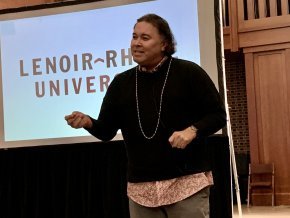
Vance Blackfox lecture series focuses on forgotten history
The history of Indigenous peoples in North America is the mostly untold history of the United States. In a three-part lecture series sponsored by the Living Well Center for Vocation and Purpose, Vance Blackfox — Indigenous theologian, activist and director of Indigenous ministries and tribal relations for the Evangelical Lutheran Church in America (ELCA) — reveals that history for his audiences with an eye toward understanding and moving forward.

“You become better at communicating with people from other cultures if you have some knowledge and aren’t starting at level zero,” Vance explained in his opening remarks during the first lecture of the series ‘Turtle Island: Indian 101’ in Grace Chapel on Oct. 24.
As part of the first session of the series, Blackfox provides an overview of the often uncomfortable but necessary truths about the ways European settlers and westward expansion in the Americas damaged and violated the Native peoples living here.
Blackfox shared, “The U.S. federal government doesn’t want us to remember that there were once more than 3000 tribal groups before Europeans arrived.”
As an introduction to so much forgotten history, Blackfox covers a lot of ground in this two-hour class. He begins with what it means to be a federally recognized tribe in the United States, moving through the roots of oppression set up in the language of the Declaration of Independence and the creation of reservations as white settlers consumed more land.
The treaties setting up these reservations required the U.S. government to provide tribes with three essentials — food, education and healthcare — but the delivery of these essentials set up generational trauma still visible in Native communities today.
“When the government sent military-style rations preserved in sugar and salt, we were forced to eat substances that were foreign to our bodies,” Blackfox explained. “That was the beginning of the health disparities that persist to this day.”
Likewise, healthcare was minimal or substandard, and government and church entities delivered education in often brutal conditions.
“The education came in the form of church-run or government-run boarding schools meant to make the children white and Christian,” Blackfox explained, describing the separation of generations from their Indigenous culture.
By exploring this forgotten history, Blackfox directed attention toward the church and government institutions that perpetrated these genocidal acts and how acknowledgment and accountability enable healing, which is the purpose of true education — even when the information challenges deeply set ways of thinking.
“I’m so glad to be at a liberal arts university,” he shared. “The study of liberal arts is about shifting and shaping the way we see the world and how we exist in other people’s spaces.”
The Blackfox lecture series continued Oct. 25 with “Mother Earth and Our Non-Human Relatives,” which discussed how we are connected to one another and the world around us. On Oct. 26, “Doctrine of Discovery” Blackfox looks more closely at the religious and legal roots of the history of colonialism in the Americas.
In addition, Blackfox will lead a blanket exercise — an experiential history of Indigenous peoples and their relationship with European explorers, settlers, and the U.S. government — on Oct. 26 at 2 p.m. in P.E. Monroe Auditorium. Advance sign up through the Living Well Center is recommended.

The Class of 2025 achieved Lenoir-Rhyne’s highest post-graduation success rate on record, with 99% employed or continuing their education. The results underscore LR’s focus on preparation, purpose and outcomes.
View More
Named Charlotte Mecklenburg and North Carolina School Counselor of the Year, Mena uses her background in mental health and education to strengthen student success and family engagement.
View More